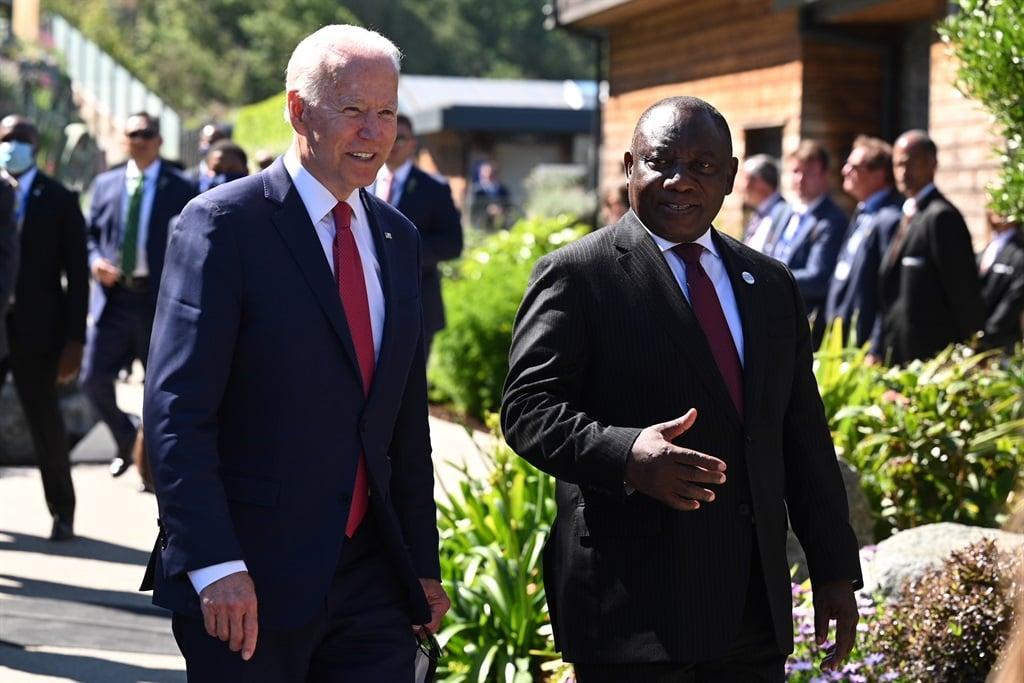Africa-Press – South-Africa. On the eve of the 15th BRICS summit, both SA and US diplomatic sources say they believe that relations between the two countries have improved, with the US adding that there has been more engagement in the past six months than in the past decade.
The BRICS summit, which starts in Sandton on Wednesday afternoon, will highlight SA’s relationship with two of the US’s global opponents: Russia, with which it is indirectly at war, and China, with which it is engaged in a growing contest for geopolitical influence.
In an address to the nation on Sunday evening, President Cyril Ramaphosa stressed that SA was non-aligned and would not take sides in the conflict between global superpowers.
A crisis in US-SA relations was provoked in May when US Ambassador Reuben Brigety claimed that SA had loaded arms onto a Russian ship. Leaked reports have said the claims were unfounded. But the threat to the relationship provoked a flurry of diplomatic efforts.
Zane Dangor, director-general of the Department of International Relations and Cooperation (Dirco), said in an interview on Tuesday that relations with the West, but particularly with the US, had markedly improved:
While SA says that it supports the UN charter and condemns Russia’s illegal use of force, it has refused to condemn its invasion of Ukraine.
“We’ve used our statements to criticise Russia for unlawful use of force, which is against the charter, but we didn’t go out and condemn them in a way that we would not be able to convene any talks with them. And they (Russia) were not happy about it. After one of the explanations of votes, they said that our actions were hostile,” says Dangor.
Asked if diplomatic relations with SA had improved in the past six months, US Embassy spokesperson David Feldmann said that the “steady stream” of high-level and working-level engagements was evidence of a clear commitment by both parties to the relationship.
Said Feldmann:
At the highest level, this included meetings between US President Joe Biden and Ramaphosa in Washington, DC and between Secretary of State Blinken and Secretary of the Treasury Janet Yellen and their counterparts in Pretoria.
Washington, DC has also had political and business delegations in both directions with “scores of South African government, business, civil society, and political leaders” in the past three months. South Africa is also set to host the AGOA (African Growth Opportunity Act) Forum in November, says Feldmann.
In his address, Ramaphosa also referred to hosting the AGOA forum, which he said SA would use to “strengthen economic ties between African countries and the United States.” SA plans to invite more than 30 African trade ministers and senior US Administration and Congressional representatives to the forum scheduled for November this year.
In the wake of the Lady R crisis, there were fears that SA would lose its preferential trade access under AGOA. This was underlined by a letter to the White House by a group of Democratic and Republican party legislators who questioned whether it was appropriate for SA to host the AGOA forum as it was “in danger of losing AGOA benefits”. They cited several examples of SA’s stance on Russia, which they said was not friendly to the US, among the preconditions to be part of AGOA.
The action prompted a delegation of government, business and trade union leaders to Washington to appeal for early inclusion.
On Feldmann’s comments, the threat that the AGOA summit would be moved seems to have receded. SA will nonetheless need to provide the US with a strong motivation of why – as a middle-income country with a complicated relationship with the US’s global opponents – it should remain in AGOA for the next round.
For More News And Analysis About South-Africa Follow Africa-Press






